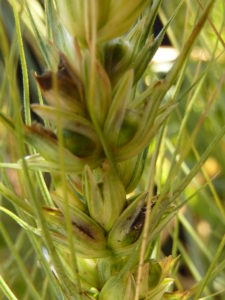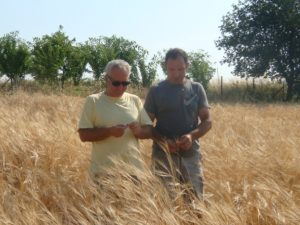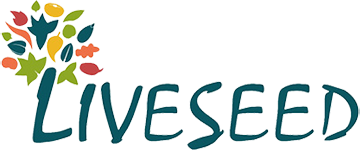Organic seed
Seeds are the foundation of farming. Therefore, organic production should start with organic seed that has been multiplied under organic conditions, using cultivars that are adapted to the organic farming system. Applying organic seed is mandatory according to the European organic regulation, but untreated conventional seed is still used to varying extent in different countries.
“LIVESEED is a unique opportunity to increase the volume and quality of organic seeds in Central-Eastern Europe.”
Dóra Drexler, ÖMKi
LIVESEED delivers novel organic seed health strategy
 Carrot: Alternaria sp. fungal disease transmitted through seeds
Carrot: Alternaria sp. fungal disease transmitted through seeds Winter wheat: Common bunt (tilletia caries) is a seed borne disease causing severe problems for organic farmers
Winter wheat: Common bunt (tilletia caries) is a seed borne disease causing severe problems for organic farmers

Organic plant breeding
Besides the way seed is multiplied, the right choice of cultivar is also crucial. Cultivars for organic agriculture need specific traits: tolerance or resistance against pest and diseases, a fast-growing root system to improve the uptake of nutrients, and quick ground coverage to suppress weeds. Most seed used by organic farmers was initially bred for conventional agriculture, meaning their traits are not fully adapted to organic farming. Only a few organisations invest in organic breeding programmes, mainly due to the low return on investment.
“Networking of different initiatives in Europe is important to promote organic seed production, use, and enhance organic breeding”
Gebhard Rossmanith, Bingenheimer Saatgut
What is organic plant breeding?
Read the common position and definition on organic plant breeding from the European Consortium for Organic Plant Breeding (ECO-PB). LIVESEED partners consider these 14 criteria as foundation of their work. In this document you can read LIVESEEDs definition for organic cultivar development.
LIVESEED supports these breeding activities
 White Lupin: Fostering collaboration in breeding and widening the genetic base in composite cross population with molecular approaches
White Lupin: Fostering collaboration in breeding and widening the genetic base in composite cross population with molecular approaches Brassicas: Initiate a European network for cell-fusion free brassica vegetables and rapeseed breeding
Brassicas: Initiate a European network for cell-fusion free brassica vegetables and rapeseed breeding Apple: Initiate a European organic apple/rootstock breeder network
Apple: Initiate a European organic apple/rootstock breeder network Winter wheat: Support organic winter wheat breeders by providing modern breeding tools to improve resistance to seed born diseases (Tilletia caries)
Winter wheat: Support organic winter wheat breeders by providing modern breeding tools to improve resistance to seed born diseases (Tilletia caries) Tomato: Support participatory tomato breeding in Italy and Spain
Tomato: Support participatory tomato breeding in Italy and Spain New breeding methods and co-designing approaches for perennials (grass- legume mixtures) & annuals (cereals)
New breeding methods and co-designing approaches for perennials (grass- legume mixtures) & annuals (cereals)
A workshop on heterogenous materials took place in Angers, France on 6th December 2018. The presentations of the workshop can be found on the Conference and Workshop Materials page here.
An overview presentation on why does organic farming need more varieties derived from organic breeding by Urs Niggli can be found here.

 Liveseed
Liveseed Liveseed
Liveseed